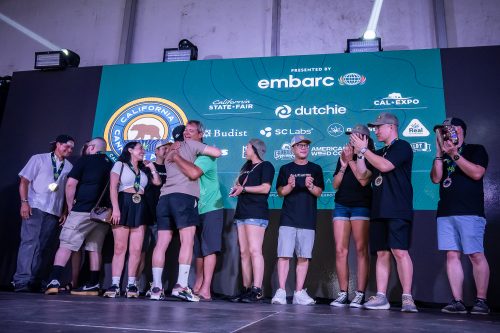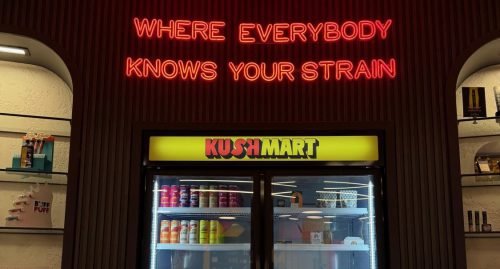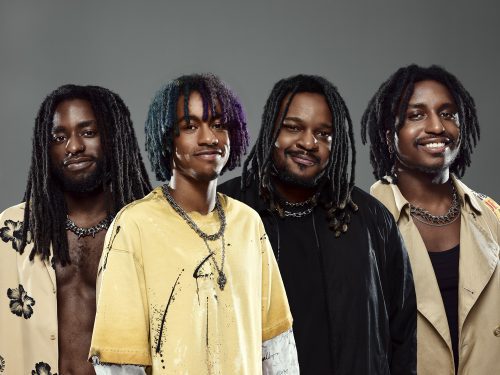We got the opportunity to talk to Habstrakt in Seattle among his busy tour schedule with Jauz on the Dangerous Waters Tour. The talented French producer and DJ has collaborated with plenty of other well-known artists such as Skrillex, Eptic, and more. Habstrakt is not afraid to cross genre boundaries to expand and create his own sound. He has played at EDC, Ultra, HARD Summer, Paradiso and more. Habstrakt has been on the rise and established his place in EDM. So make sure he’s on your radar!
Exclusive Habstrakt Interview
*Interview edited for clarity*
RMR: Can you introduce yourself to people who might not be familiar with you?
Habstrakt: My name is Adam, aka Habstrakt. I’m a music producer and DJ from the south of France. I live in L.A. now and make a weird type of house music that’s got a lot of attitude. I think that’s the best way to describe my project.
RMR: You’ve talked about how you were introduced to music at a young age and started making electronic music at 13 in past interviews. Did you have any resources at the time that helped you in that process?
Habstrakt: It was mostly trial and error for me. I was geeking around for a while and using drum machine boxes and synthesizers. I was just curious about signal flow and electronics in general, so I wasn’t really into building songs and making proper pieces of music. But I think that’s still something I carry with me; that curiosity about songs and equipment.
RMR: What’s the music scene in France like and did it influence you in any way when producing and making your own music?
Habstrakt: I’m really proud of coming from this background, it’s something very different. We don’t have as many idols, but we look under the same big names like Justice, Daft Punk, and more recently, Gesaffelstein, DJ Snake, Tchami x Malaa. The people we looked up to were never scared of boundaries, and they always experimenting and pushing the sound of music. We’ve kept that kind of hustle for what we believe in instead of following the lane.

RMR: After traveling abroad, meeting other artists and being exposed to different music around the world, is there anything valuable you picked up and learned?
Habstrakt: Definitely- the American rave scene. I love it and I think people are very open-minded. A lot of people would say it’s judgmental but I think it’s not, compared to where I come from. People have a lot of liberties in the way they dress and the way they express themselves. To me, that’s the purpose of a rave. To forget about your life for a second, to forget about everything and have fun. In France, we don’t have much fun. So I think that’s something I’ve learned from opening up to the rest of the world.
RMR: You’ve also mentioned in interviews that you worked in the food industry before doing music full time. What was it that made you commit to a music career?
Habstrakt: It was an accident! I didn’t want to do this thing, and it just sort of happened. As I said, I was curious about synthesizers and I was making music, but I was doing fine working in restaurants. I was making good money, I was happy and I loved it. I loved the intense work schedule and there’s just something about proper hard work. When you come from a poor background like mine, you don’t have a choice, you have to work.
It just so happened that I started transitioning to make more songs and sent that to DJs. My music began getting picked up by radio and I was DJing on the side here and there. Eventually, I was making enough money monthly through shows to be able to make just as much despite not showing up to work. I realized I could pay my rent just by staying home to make music and playing shows here and there. But it was an accidental transition, I was like, ‘I’m going to try this DJ thing.’ I thought I was going to go back to the kitchen, and sometimes I still think that.
RMR: In a recent Instagram post, you shared that you met JAUZ online years ago. Do you mind sharing that story and how you got invited on the road?
Habstrakt: He sent me “Feel the Volume” in a DM. I had heard of him before but this was when we both started messing around with house music. I checked it out and I was like “This is the future, this is insane.” From then on the rest is history. That was 2014, then I met him for the first time in 2015. He said I was one of his first choices for direct support and I was really happy I got to do that. I’ve always loved his music and his shows, so to see all the stage production now, I’m really proud to be a part of that. And I love the idea of a tour bus tour, it’s great for artists to focus on music and relax.
RMR: Speaking of tour life, lots of artists find themselves eating unhealthily. You yourself being a chef, do you fall guilty into that category or is your fridge always stocked with fresh produce?
Habstrakt: It’s super hard. It’s one of the biggest dramas of my life. Especially when I have to leave my house for three weeks of tour and I have to throw away all my food. It breaks my heart because I’m old-school and I just want to bang on my neighbor’s door and offer them the food. Eating on the road is really hard and it’s a lot of work. Your body is a machine and you need every part to be operational. You can’t neglect that one part and decide to eat junk food today then try to make an effort tomorrow. You can’t really make exceptions so it’s a big challenge for me. So it’s rewarding to be able to cook myself a nice meal when I get home.

RMR: One of your most well known tracks is “Chicken Soup” with Skrillex. When making it, did you know that it’d be such a hit?
Habstrakt: Yes, especially working with Skrillex because he goes so quick and he has a vision of not just the melody, but how the song is supposed to make you feel on the inside. There’s this moment in my head when I’m thinking, ‘This is either complete trash or the absolute future.’ Before we had the vocals, it seemed like a weird song. I wasn’t sure about it for a while, but I think he always knew.
RMR: Has there been a moment in your career when it really hit you that you’re making music for a living?
Habstrakt: You know what, I had such a stressful year last year that my new year’s resolution is to have more moments like that. More moments where I actually sit down and smell the roses and realize all this is amazing. You can always compare yourself to bigger artists, but you should always remember where you come from and the progress that’s been made. This is something I’m trying to work on right now- to appreciate myself and my skills. It’s great that I get to travel the world, and I never thought I’d leave my hometown when growing up.
RMR: Other than your next single, “Free” that’s coming out very soon, what can we expect from you in 2020?
Habstrakt: Looking back at my previous years (2017, 2018), I’ve only released three songs a year since I was going through a rough patch then and not really focused on music and I was doubting myself a lot. Last year, I tried something different. I tried to put more music out even if I’m not entirely sure of the music. Thanks to that I’ve built back some self-confidence and skills. So I think what you can expect this year that’s going to be different from the last is that every song I’m going to put out is going to be more focused. There’s a lot of songs I’m sitting on that I’ve been testing out and I’m going to try different things as well. Without saying too much, I think some records will surprise people.







